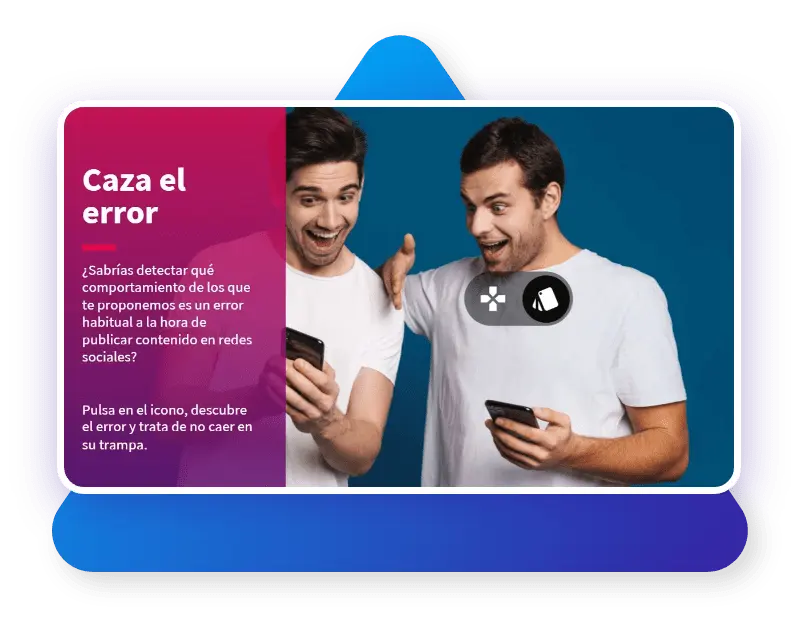Table of contents
ToggleSoft skills are non-technical skills that define how employees interact with others, establish relationships, and perform their daily activities.
For your workforce to reach its full potential and align with business objectives, it is essential to have optimal soft skills training that provides key resources for professional growth.
In this article, you’ll uncover the latest trends in soft skills training for the modern learner, explore their specific needs, and discover cutting-edge technology to enhance your employees’ soft skills.
Understanding the latest generations of employees: What does their profile look like?
Before we delve into the top trends in soft skills to ensure that your training is truly effective, we first need to answer a few key questions. Who makes up the newest generations of employees? What do we really know about them? And what features should we consider when designing a training program for them?
When we talk about modern learners, or the latest generations of employees, we really mean those who grew up in a digital environment. This group is constantly connected through the internet and social media, and in an endless search for instant information. Employees from this generation tend to be curious and adaptive. preferring interactivity over static learning. Let’s take a closer look at some of the habits, preferences and learning styles of the modern learner:
Less free time available
The modern learner is busy, so it can be difficult to capture their attention. According to a study by Atlassian, an employee is interrupted 56 times a day. They spend 25% of their workday on emails and check their phone, on average, about 150 times.
Their attention span is lower
Research conducted by Deloitte portrays the “modern learner” as an individual characterized as “impatient, easily distracted, thirsty for learning, but at the same time overwhelmed and often overworked.”
Preference for visual content
According to the National Biological Information Center of the United States, 65% of individuals learn better through visual media, rather than through reading.
Studies point to the fact that the new workforce or modern learner does not have much time to focus on learning and prefers content consumption marked by new technologies. Points that you should know and apply to your training strategy.
 Get your modern learners addicted: Training trends in soft skills
Get your modern learners addicted: Training trends in soft skills
Effective soft skills training strategies for the modern learner use technology to facilitate learning, support the consumption of micro-content and adapt to the new times, evaluating organizations and employees’ future needs.
In addition, it is also important to consider current work scenarios, such as hybrid or remote work. Thus, trends in soft skills training respond to the needs of the new modern learner and a changing work environment:
1. Reskilling and Upskilling
Reskilling refers to an employee’s training for a new job within the company. That is, to learn new skills and competencies. This process is usually conducted when a vacancy needs to be filled internally. Organizations usually opt for reskilling when they have professionals who have already demonstrated their efficiency in another similar position.
Upskilling, on the other hand, is a training method where a professional acquires new skills and competencies to grow within their current role. It improves their productivity in their own position and facilitates internal promotion within the company. Through upskilling actions, employees improve their work performance and acquire strategic importance for the organization, which will be key to achieving business objectives.
It is important to include a reskilling and upskilling strategy that focuses on developing the soft skills that workers will need for new positions and the company’s future needs.

2. Learning by doing
Soft skills typically involve abilities like teamwork, communication, resilience and commitment. The difficulty with concepts like these is that it can be quite difficult to measure the impact of training. Current soft skills training trends focus more on reinforcing behaviors than competencies, but this involves identifying desirable attitudes, giving them parameters, and then teaching them effectively. How can we achieve this?
Learning by doing is the ideal methodology to help with this process. It is an experimentation-based approach that asks students to acquire and hone skills through practice. By facing and confronting real-life situations, individuals can learn to navigate challenges, work as a team, communicate effectively and adapt to change – all within a practical and dynamic context.
In fact, studies show that practice is the most effective way to learn and remember. According to McKinsey, employees tend to value practical learning over theoretical learning, since it better prepares them to apply the knowledge they’ve picked up to solve real-life problems.
 3. Microlearning
3. Microlearning
Microlearning is a more engaging format, which is less time-consuming and faster to produce than a traditional e-learning course. It is surprisingly effective for soft skills development, thanks to its small learning units of short duration.
It offers short doses of content for learners to study at their convenience. Content can take many forms, but it should always be brief. According to a recent Gallup survey, 58% of employees are more motivated to use their company’s training tools when the content is presented in a microlearning format.
Today’s users have limited time and attention spans. That is why they prefer short videos (on average less than two minutes), and visual resources, practical, intuitive, and varied.
 4. Podcast
4. Podcast
According to recent data, in 2023 over 400 million people consumed information through podcasts across the world. This figure is set to continue rising. It is important to take advantage of this growing consumption trend and apply it to creating e-learning content. The greatest benefit offered by this type of content is that it can be consumed while doing other activities because it does not require full visual attention.
In addition, with podcasts, the content and possibilities are endless. You can create podcasts on any topic, including business management, team building, project organization, resilience, or adapting to change.
5. Blended learning
Blended learning is a type of learning that combines distance and face-to-face learning to achieve a more dynamic and efficient experience. This model provides flexibility and makes it easier to watch videos and recorded lectures, study online reading material and even participate in online discussions with social features.
The greatest benefit of blended learning is its high engagement. According to a Blackboard K-12 report, students tend to be more engaged when studying under such a model. The report shows that 59% of teachers surveyed said that students were more motivated to learn in a blended learning environment as opposed to a traditional one.
6. Personalized learning with AI recommendations
This technology allows e-learning solutions to meet the specific training needs of organizations. Examples include personalized content recommendations inside courses, and training materials tailored to reinforce the skills and disciplines you want to improve.
An AI recommendation feature allows a company to take control over the direction of their learning, rather than following a rigidly defined preset path. And thanks to the isEazy Skills Artificial Intelligence recommender, we can help you locate the best titles from our catalog in seconds, based on the specific skills you’re looking to develop. Just tell us what you need, and let us do the rest!
7. Gamification
Gamification in e-learning has become increasingly popular, as it offers a wide range of advantages for learners and can help make the overall e-learning experience more enjoyable and effective.
Gamification helps transform educational material into exciting and entertaining content. The rewards often used in games as reinforcement become a satisfying and highly motivating factor. In addition, it helps to focus on different tasks according to their priority, which is beneficial for improving concentration. Teachers and modern learners can monitor their performance in real time by providing immediate feedback.

Trends in soft skills set to make a difference in 2024
Although, naturally, technical skills are just as important as soft skills, the relative ease of developing soft skills has made them the focus of most organizations. After all, what could be easier than improving a skill by watching a 3-minute tutorial? In recent years, soft skills have become so valued for their ability to empower professionals that they’ve been dubbed Power Skills. But which are the most important?
Emotional Intelligence
Emotional intelligence is a skill that allows people to identify and understand both their own emotions and those of others. This is an essential skill in today’s professional environment, where diverse groups of employees need to work effectively together in teams. Developing this skill also helps to build others such as communication, leadership and problem solving.
Critical thinking and problem solving
Critical thinking allows employees to look at challenges and issues from a different perspective, with a much more strategic and analytical mindset. It’s about learning to make informed decisions, assess the range of available options, and consider multiple possible outcomes. It goes hand-in-hand with problem solving – understanding how to address problems, disputes or disagreements in a positive and constructive way. These two skills in combination allow employees to advance their careers with confidence, and make valuable contributions to the wider company.
Resilience and Adaptability
Finally, adaptability and resilience are vital skills in an ever-shifting and evolving professional landscape. These allow people to keep on top of trends and remain relevant in their professional disciplines. Additionally, for employers, having adaptable and resilient employees within a company is a valuable asset – allowing them to quickly recover from potential setbacks and adjust strategy when necessary.
Why is investing in soft skills training crucial for your team?
Investing in soft skills training is key for modern companies, because it offers a series of tangible benefits that have a direct impact on both their success and sustainability. Companies that prioritize this type of training enjoy significant improvements in internal communication – making it easier to coordinate across departments and reduce errors, as well as optimize operational processes.
Moreover, a team that’s well trained in these areas tends to be more productive and efficient across the board. They know how to collaborate constructively, as well as manage their time and resources better.
Training in soft skills also strengthens talent retention, since employees feel more valued and motivated, which reduces the costs which stem from high staff turnover. Finally, with the advantage of a strong team that knows how to face and overcome challenges, companies become more resilient and adaptable to sudden market changes. This helps them to ensure a sustained competitive advantage.
Keep your team up to date with the latest trends in soft skills – using the best e-learning technology
To give the best soft skills training for the modern learner, you need an innovative solution that adapts to their specific needs. isEazy Skills works with the latest digital learning technology and content consumption formulas to create a unique and effective learning experience. Thanks to its 100% practical method and multimedia and interactive resources, isEazy Skills helps generate habits that professionals can quickly transfer to their workplace.
Enjoy the most complete catalog of soft and digital skills courses on the market, and take your professionals’ skills to the next level. What are you waiting for? Request a demo today!
Frequently Asked Questions about trends in soft skills
Soft skills are a combination of social, communication, emotional, and behavioral skills that allow people to interact effectively with others. Unlike technical or hard skills, which involve the ability to perform a small set of job-specific tasks, soft skills are transversal, and can be used across all activities and sectors. Examples include teamwork, good communication and conflict resolution, but there are many more.
Soft skills are crucial in the workplace because they not only improve productivity, but also enhance talent retention, allowing teams to adapt and thrive in an ever-changing business world. These skills have a direct impact on employees’ ability to work effectively as a team or become empathetic leaders and managers of conflict. These abilities ultimately determine the success of an organization.
AI offers personalized e-learning content recommendations, which can adapt to the specific training needs of your company. For example, just tell us what skills and competencies you want to develop, and with the isEazy Skills Artificial Intelligence recommender, we’ll help you find the titles or courses that best match your needs.
Companies can easily encourage the development of soft skills in their employees by providing access to online learning platforms such as isEazy Skills. Our platform offers a wide-ranging catalog of soft and digital skills courses, following a comprehensive practical methodology that takes talent development to the next level.













